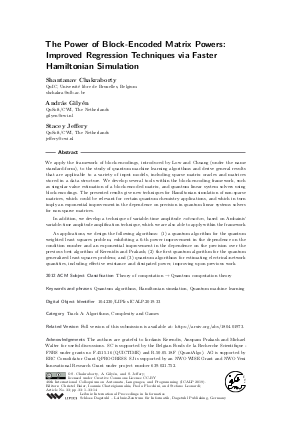@InProceedings{chakraborty_et_al:LIPIcs.ICALP.2019.33,
author = {Chakraborty, Shantanav and Gily\'{e}n, Andr\'{a}s and Jeffery, Stacey},
title = {{The Power of Block-Encoded Matrix Powers: Improved Regression Techniques via Faster Hamiltonian Simulation}},
booktitle = {46th International Colloquium on Automata, Languages, and Programming (ICALP 2019)},
pages = {33:1--33:14},
series = {Leibniz International Proceedings in Informatics (LIPIcs)},
ISBN = {978-3-95977-109-2},
ISSN = {1868-8969},
year = {2019},
volume = {132},
editor = {Baier, Christel and Chatzigiannakis, Ioannis and Flocchini, Paola and Leonardi, Stefano},
publisher = {Schloss Dagstuhl -- Leibniz-Zentrum f{\"u}r Informatik},
address = {Dagstuhl, Germany},
URL = {https://drops-dev.dagstuhl.de/entities/document/10.4230/LIPIcs.ICALP.2019.33},
URN = {urn:nbn:de:0030-drops-106092},
doi = {10.4230/LIPIcs.ICALP.2019.33},
annote = {Keywords: Quantum algorithms, Hamiltonian simulation, Quantum machine learning}
}

 Creative Commons Attribution 3.0 Unported license
Creative Commons Attribution 3.0 Unported license
